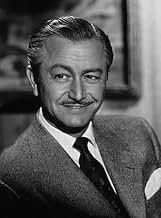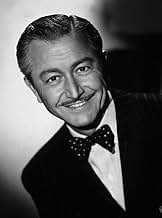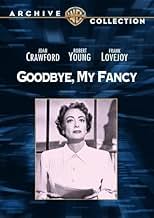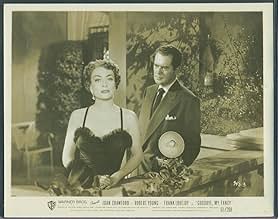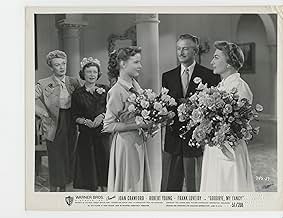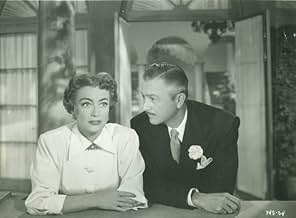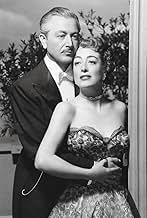Congresswoman returns to college to reignite romance with president, facing rival and her controversial film threatening his job.Congresswoman returns to college to reignite romance with president, facing rival and her controversial film threatening his job.Congresswoman returns to college to reignite romance with president, facing rival and her controversial film threatening his job.
- Director
- Writers
- Stars
- Awards
- 1 win total
Leah Baird
- Party Guest
- (uncredited)
George Bunny
- Janitor
- (uncredited)
Mary Carver
- Joan Wintner
- (uncredited)
Beulah Christian
- Party Guest
- (uncredited)
James Conaty
- Party Guest
- (uncredited)
Frank Conlan
- Frank
- (uncredited)
- Director
- Writers
- All cast & crew
- Production, box office & more at IMDbPro
Featured reviews
Goodbye, My Fancy (1951)
** 1/2 (out of 4)
Rather bizarre and uneven mix of comedy and drama features congresswoman Agatha Reed (Joan Crawford) going back to her college to receive an honorary degree. Her main reason for wanting to go back is so she can see a former love (Robert Young) who she was expelled from school for sneaking out to see. Once back on campus she ends up caught between him and a photographer (Frank Lovejoy). GOODBYE, MY FANCY has pretty much been forgotten over the years and it's easy to see why because it's really not part of Crawford's high standards, which she started six years earlier with MILDRED PIERCE and followed with some very impressive bits of work. This film here is mildly entertaining on a few levels but overall you've got to consider it a pretty disappointing picture. One of the biggest problems is that it runs 106-minutes and probably could have lost a good sixteen-minutes if not more. I say this because there's just so much going on in this picture and with so much happening the film just seems too long and uneven. The early portion of the film makes you think that we're in for some sort of weird comedy and we're given various silly scenes. Then the film because a rather bland romantic-comedy but things change yet again when we get a rather long political debate about freedom. I think the final twenty-five minutes or so are actually the best part of the film as the Crawford character tries to fight to get a film shown that tells young people some of the horrors that are out there. As for Crawford, she turns in a good performance but there's certainly nothing all that memorable here. This is the type of role should could do without trying but it's always nice seeing her. Young is pretty bland in his role but thankfully Lovejoy adds some energy when he's on screen. Eve Arden is good as the secretary and Janice Rule is also nice as Young's daughter. GOODBYE, MY FANCY really isn't going to appeal to many except for Crawford fans wanting to see everything she did.
** 1/2 (out of 4)
Rather bizarre and uneven mix of comedy and drama features congresswoman Agatha Reed (Joan Crawford) going back to her college to receive an honorary degree. Her main reason for wanting to go back is so she can see a former love (Robert Young) who she was expelled from school for sneaking out to see. Once back on campus she ends up caught between him and a photographer (Frank Lovejoy). GOODBYE, MY FANCY has pretty much been forgotten over the years and it's easy to see why because it's really not part of Crawford's high standards, which she started six years earlier with MILDRED PIERCE and followed with some very impressive bits of work. This film here is mildly entertaining on a few levels but overall you've got to consider it a pretty disappointing picture. One of the biggest problems is that it runs 106-minutes and probably could have lost a good sixteen-minutes if not more. I say this because there's just so much going on in this picture and with so much happening the film just seems too long and uneven. The early portion of the film makes you think that we're in for some sort of weird comedy and we're given various silly scenes. Then the film because a rather bland romantic-comedy but things change yet again when we get a rather long political debate about freedom. I think the final twenty-five minutes or so are actually the best part of the film as the Crawford character tries to fight to get a film shown that tells young people some of the horrors that are out there. As for Crawford, she turns in a good performance but there's certainly nothing all that memorable here. This is the type of role should could do without trying but it's always nice seeing her. Young is pretty bland in his role but thankfully Lovejoy adds some energy when he's on screen. Eve Arden is good as the secretary and Janice Rule is also nice as Young's daughter. GOODBYE, MY FANCY really isn't going to appeal to many except for Crawford fans wanting to see everything she did.
In a part that was tailor made for Rosalind Russell but that she had to pull out of at the last minute Joan Crawford gets a chance to shade her diamond hard persona somewhat in this tale of remembered love.
It's really a story of how we remember people and how time changes them. The part and Joan aren't a perfect fit but she does try and does a decent job of it. As in Mildred Pierce she and Eve Arden interact wonderfully and their few scenes have a nice snap.
Actually Joan's casting isn't the only one that seems off. While Robert Young is fine as the conflicted college president Frank Lovejoy is wrong as the inquisitive reporter. He was a good tough guy actor but Robert Montgomery or Clark Gable would have been more suitable, the part is the second lead so neither would have considered it.
Someone who is perfectly cast however is the wonderful Lurene Tuttle, as the seemingly simpleminded college chum of Joan. She is funny and touching and steals any scene she's in with ease.
The film does have a message about being true to your ideals but is mostly a bittersweet romance and an enjoyable one at that.
It's really a story of how we remember people and how time changes them. The part and Joan aren't a perfect fit but she does try and does a decent job of it. As in Mildred Pierce she and Eve Arden interact wonderfully and their few scenes have a nice snap.
Actually Joan's casting isn't the only one that seems off. While Robert Young is fine as the conflicted college president Frank Lovejoy is wrong as the inquisitive reporter. He was a good tough guy actor but Robert Montgomery or Clark Gable would have been more suitable, the part is the second lead so neither would have considered it.
Someone who is perfectly cast however is the wonderful Lurene Tuttle, as the seemingly simpleminded college chum of Joan. She is funny and touching and steals any scene she's in with ease.
The film does have a message about being true to your ideals but is mostly a bittersweet romance and an enjoyable one at that.
"Goodbye, My Fancy" stars Joan Crawford, Robert Young, Eve Arden, and Frank Lovejoy and was made in 1951. It was originally a play by Fay Kanin that enjoyed a run of over a year. Madeleine Carroll starred.
Crawford in 1951 was 44, and in those days, after an actress turned 30, she went into supporting roles. It's to Crawford's credit that she stayed a leading lady well past 30, albeit in lesser films.
This film is actually a good one. Crawford plays a Congresswoman, Agatha Reed, who is invited back to her old college to receive an honorary degree. She is thrilled, for more than one reason.
Agatha has happy memories there and has never forgotten her old love and, though she doesn't state it, she's hoping to see him again. Also, she finds it amusing that she's been invited -- she was expelled from the school for staying out all night and didn't graduate.
Agatha and her able assistant (Eve Arden) travel to the college, dogged the entire way by a photographer (Frank Lovejoy) with whom Agatha had an involvement a few years back.
Agatha has filmed a documentary that she wants to show at the school. The film is about what happens when people are denied their freedoms, and deals with book burnings, persecution of teachers, etc. She is shocked to find that there is some question as to whether or not the film will be shown.
"Goodbye, My Fancy" is about going home again, and underneath Agatha having two men interested in her, it makes a statement about McCarthyism which was so rampant at the time. It's also about standing up for what you believe in and having integrity -- true ethics kick in when you've got something to lose.
I saw some comments about Crawford being miscast - I'm not sure why - she played strong career women for many years.
The casting is off, but it's not Crawford. It's partly the script and partly the casting. Robert Young is very good as the President -- handsome, charming, and formal.
Eve Arden is funny as the assistant, wisecracking her way through the role. Shirley Booth played the role on Broadway.
The role that's miscast is Frank Lovejoy as Matt Cole. The role called for a macho, attractive tough guy and instead we get the rather sloppy, wisecracking Lovejoy. The ending of the film seemed to come out of nowhere.
Otherwise, fairly enjoyable, good cast.
Crawford in 1951 was 44, and in those days, after an actress turned 30, she went into supporting roles. It's to Crawford's credit that she stayed a leading lady well past 30, albeit in lesser films.
This film is actually a good one. Crawford plays a Congresswoman, Agatha Reed, who is invited back to her old college to receive an honorary degree. She is thrilled, for more than one reason.
Agatha has happy memories there and has never forgotten her old love and, though she doesn't state it, she's hoping to see him again. Also, she finds it amusing that she's been invited -- she was expelled from the school for staying out all night and didn't graduate.
Agatha and her able assistant (Eve Arden) travel to the college, dogged the entire way by a photographer (Frank Lovejoy) with whom Agatha had an involvement a few years back.
Agatha has filmed a documentary that she wants to show at the school. The film is about what happens when people are denied their freedoms, and deals with book burnings, persecution of teachers, etc. She is shocked to find that there is some question as to whether or not the film will be shown.
"Goodbye, My Fancy" is about going home again, and underneath Agatha having two men interested in her, it makes a statement about McCarthyism which was so rampant at the time. It's also about standing up for what you believe in and having integrity -- true ethics kick in when you've got something to lose.
I saw some comments about Crawford being miscast - I'm not sure why - she played strong career women for many years.
The casting is off, but it's not Crawford. It's partly the script and partly the casting. Robert Young is very good as the President -- handsome, charming, and formal.
Eve Arden is funny as the assistant, wisecracking her way through the role. Shirley Booth played the role on Broadway.
The role that's miscast is Frank Lovejoy as Matt Cole. The role called for a macho, attractive tough guy and instead we get the rather sloppy, wisecracking Lovejoy. The ending of the film seemed to come out of nowhere.
Otherwise, fairly enjoyable, good cast.
I'm glad to see that TCM has chosen to include this film in its lineup. I have, however, noted an error in the TCM and Wikipedia summaries regarding filming location. Both cite Occidental College in Eagle Rock, Calif. as the site for outdoor scene filming. In fact, most if not all were shot on the University of Redlands campus in Redlands, Calif. I attended the U. of R. for 4 years and graduated in the outdoor Greek Theater that appears in the film. Other scenes show the U. of R.'s distinctive chapel with the San Bernardino Mountains beyond, as well as the school's administration building on Ad Hill, its quadrangle and residence halls. The movie was shot two years before I enrolled there. Perhaps Warner Bros. had originally intended to film Goodbye My Fancy on the Occidental campus (much closer to the studio) and for whatever reason had to switch at the last minute to Redlands, but the planned LA area location remained on the studio's records.
Goodbye My Fancy finds Joan Crawford taking over a role popularized by fellow film star Madeline Carroll on stage as a member of the House Of Representatives coming back to her former college to accept an honorary degree. She's invited by college president and former boyfriend Robert Young.
There's a lot of history here and this is the only degree she'll have from the College Of New Hope for women located in rural New England. Back in the day apparently Crawford was a wild child, at least wild by those standards back then. She got into a compromising situation with Young and she took the fall by herself and got expelled for it. In the interim Young in addition to rising to the presidency of the college married a woman who died and has a daughter, Janice Rule, who is going to be one of the graduates at the ceremony Crawford gets her degree.
Crawford went into journalism and then politics. She's combining the two at this point having produced a documentary about the current social problems of Europe and how Fascism by curtailing free speech contributed mightily to them. She's hoping to show the film while she's at the college.
Her opponent in this endeavor is the chairman of the board Howard St. John who also happens to be now married to Crawford's former roommate Lurene Tuttle. He's got the part that actors like Eugene Palette and Charles Dingle normally were cast in, the arrogant, self righteous right wing blowhard who thinks he ought to be controlling the educational process. Not that he's against free speech mind you, but he feels that kids should not be exposed to this kind of serious work. He in fact donated the campus movie theater and he'd like for them to show entertainment that he approves of, such as his favorites Abbott&Costello.
Young's dependent on St. John's good will for his job. But one who isn't and is also a rival for Crawford is Frank Lovejoy, a Time&Life war photographer who is covering this event. He'll expose Young's timidity if for no other reason than to shame him in front of Joan.
Goodbye My Fancy was written by Fay Kanin and ran for 446 performances on Broadway during the 1948-49 season and was directed by Sam Wanamaker who also played the Frank Lovejoy part. The college president was played by another former movie name, Conrad Nagel.
The play took home a Tony Award for Shirley Booth who played Crawford's Congressional aide and has some really funny Eve Arden type lines. When the film came out the Eve Arden part was played by Eve Arden.
The play draws heavily on themes expressed in James Thurber's The Male Animal. If anything it's more serious here because whereas in The Male Animal, trustee Eugene Palette objected to the content in reading Nicolo Sacco's letter in class, St. John just objects to the idea of material that is mind challenging in the classroom in general. What does this imbecile think they're going to college for. In fact there's a minor role played by Morgan Farley as a physics professor who is intending to leave the college because of the limits he's being put under and Farley plays it well.
Coming out as it did during the House Un-American Activities Committee days and after Joe McCarthy started finding Communists in all kinds of places, Goodbye My Fancy was quite the courageous project for Warner Brothers at the time. It's a timeless tribute to the value of free speech and the marketplace of ideas that a university is supposed to be.
This is a film that I think needs a remake. Can you see some trustee on a university today throwing his weight around and maybe filling the campus cinema with reruns of Saturday Night Live in order that students not concentrate on serious issues?
I think it could be done.
There's a lot of history here and this is the only degree she'll have from the College Of New Hope for women located in rural New England. Back in the day apparently Crawford was a wild child, at least wild by those standards back then. She got into a compromising situation with Young and she took the fall by herself and got expelled for it. In the interim Young in addition to rising to the presidency of the college married a woman who died and has a daughter, Janice Rule, who is going to be one of the graduates at the ceremony Crawford gets her degree.
Crawford went into journalism and then politics. She's combining the two at this point having produced a documentary about the current social problems of Europe and how Fascism by curtailing free speech contributed mightily to them. She's hoping to show the film while she's at the college.
Her opponent in this endeavor is the chairman of the board Howard St. John who also happens to be now married to Crawford's former roommate Lurene Tuttle. He's got the part that actors like Eugene Palette and Charles Dingle normally were cast in, the arrogant, self righteous right wing blowhard who thinks he ought to be controlling the educational process. Not that he's against free speech mind you, but he feels that kids should not be exposed to this kind of serious work. He in fact donated the campus movie theater and he'd like for them to show entertainment that he approves of, such as his favorites Abbott&Costello.
Young's dependent on St. John's good will for his job. But one who isn't and is also a rival for Crawford is Frank Lovejoy, a Time&Life war photographer who is covering this event. He'll expose Young's timidity if for no other reason than to shame him in front of Joan.
Goodbye My Fancy was written by Fay Kanin and ran for 446 performances on Broadway during the 1948-49 season and was directed by Sam Wanamaker who also played the Frank Lovejoy part. The college president was played by another former movie name, Conrad Nagel.
The play took home a Tony Award for Shirley Booth who played Crawford's Congressional aide and has some really funny Eve Arden type lines. When the film came out the Eve Arden part was played by Eve Arden.
The play draws heavily on themes expressed in James Thurber's The Male Animal. If anything it's more serious here because whereas in The Male Animal, trustee Eugene Palette objected to the content in reading Nicolo Sacco's letter in class, St. John just objects to the idea of material that is mind challenging in the classroom in general. What does this imbecile think they're going to college for. In fact there's a minor role played by Morgan Farley as a physics professor who is intending to leave the college because of the limits he's being put under and Farley plays it well.
Coming out as it did during the House Un-American Activities Committee days and after Joe McCarthy started finding Communists in all kinds of places, Goodbye My Fancy was quite the courageous project for Warner Brothers at the time. It's a timeless tribute to the value of free speech and the marketplace of ideas that a university is supposed to be.
This is a film that I think needs a remake. Can you see some trustee on a university today throwing his weight around and maybe filling the campus cinema with reruns of Saturday Night Live in order that students not concentrate on serious issues?
I think it could be done.
Did you know
- TriviaOne of the first films to show a woman with a shoulder strap purse.
- GoofsAgatha picks up a cigarette and table lighter just before Dr. Pitt comes into her room. She stands and holds them both, the cigarette unlit for the remainder of the scene.
- Quotes
Agatha Reed: We were a nice snapshot but never a family portrait.
- ConnectionsFeatured in Imaginary Crimes (1994)
- How long is Goodbye, My Fancy?Powered by Alexa
Details
Box office
- Budget
- $1,312,000 (estimated)
- Runtime
- 1h 47m(107 min)
- Color
- Aspect ratio
- 1.37 : 1
Contribute to this page
Suggest an edit or add missing content


